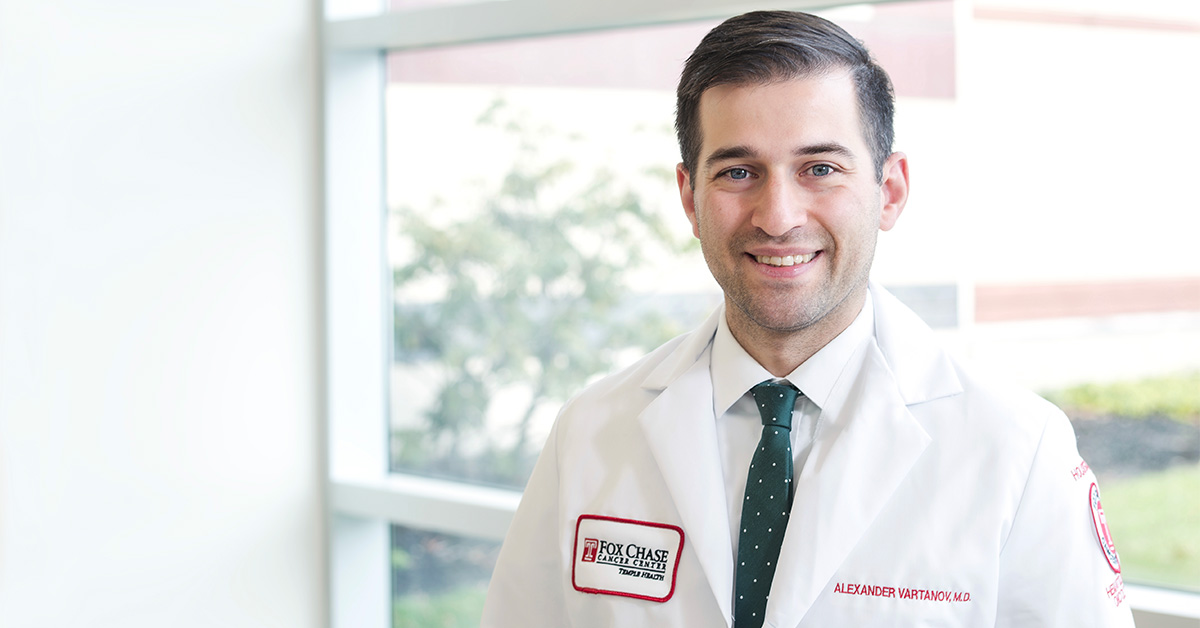
PHILADELPHIA (February 19, 2024) — Stem cell transplant recipients can reduce their risk of Clostridioides difficile (C. diff) infection by taking the oral antibiotic vancomycin preventively, according to research from Fox Chase Cancer Center presented at a scientific meeting. However, the study also shows that taking this antibiotic can increase these patients’ risk of gram-negative bacteremia.
"As we reported a year prior, this extended analysis shows that yes, vancomycin does reduce the C. diff infection rate,” said Alexander Vartanov, MD, the lead author on the study and a third-year fellow in the Department of Hematology/Oncology at Fox Chase.
“But what was interesting is that one of our secondary outcomes, specifically bacterial infections in the blood with gram-negative bacteria, was higher for the patients who received the vancomycin prophylaxis. So even though generally that group was somewhat protected from C. diff infection, they were at higher risk of developing gram-negative bacteremia. That posed a little bit of a cautionary tale for us.”
Patients who undergo stem cell transplant as part of their treatment for blood cancers such as lymphoma, leukemia, multiple myeloma, or myelodysplastic syndrome are at higher risk of life-threatening infections than the general population.
In particular, C. diff infection, an overgrowth of bacteria in the gastrointestinal tract, is a significant source of increased morbidity and mortality. Some research has demonstrated that taking vancomycin as a preventive measure can lessen risk of C. diff infection, but sufficient data are not yet available to make it a guideline-directed therapy.
To evaluate the safety and efficacy of administering vancomycin preventively, Vartanov and colleagues in the Department of Bone Marrow Transplant and Cellular Therapies at Fox Chase conducted an extended follow-up study to preliminary data that were presented at the same meeting last year.
The new retrospective study looked at infection rates for 441 patients who received hematopoietic (blood-related) stem cell transplants between March 2021 and May 2023. The patients were divided into a control group, who were not given the oral vancomycin prophylactically, and the experimental group, who were.
The researchers’ analyses confirmed that taking oral vancomycin prophylactically does reduce the C. diff infection rate in stem cell transplant recipients. The experimental group had a 7% infection rate, compared to 13% in the control group. However, the researchers also observed that the rate of gram-negative bacteremia, another serious bacterial infection, went up in the group that had taken vancomycin preventively (21.8%) compared to the control (13%).
In most cases, gram-negative bacteremia is treatable and curable, but it can be the cause of sepsis, septic shock, and even death for patients undergoing stem cell transplant. As a result, Fox Chase’s practice is to screen all patients undergoing transplant and only administer the prophylactic antibiotic to those who screen positive or have a history of C. diff.
“It’s exciting to learn from our quality improvement projects and see how we can benefit patients,” said Vartanov.
Vartanov presented the results of the study, “Using Oral Vancomycin as Prophylaxis Against Clostridioides Difficile Infection in Stem Cell Transplant Recipients is Associated with Increased Gram Negative Bacteremia,” during a poster session at the 2024 Tandem Meetings: Transplantation & Cellular Therapy Meetings of the American Society for Transplantation and Cellular Therapy and the Center for International Blood & Marrow Transplant Research, which are being held in San Antonio, Texas, February 21-24.